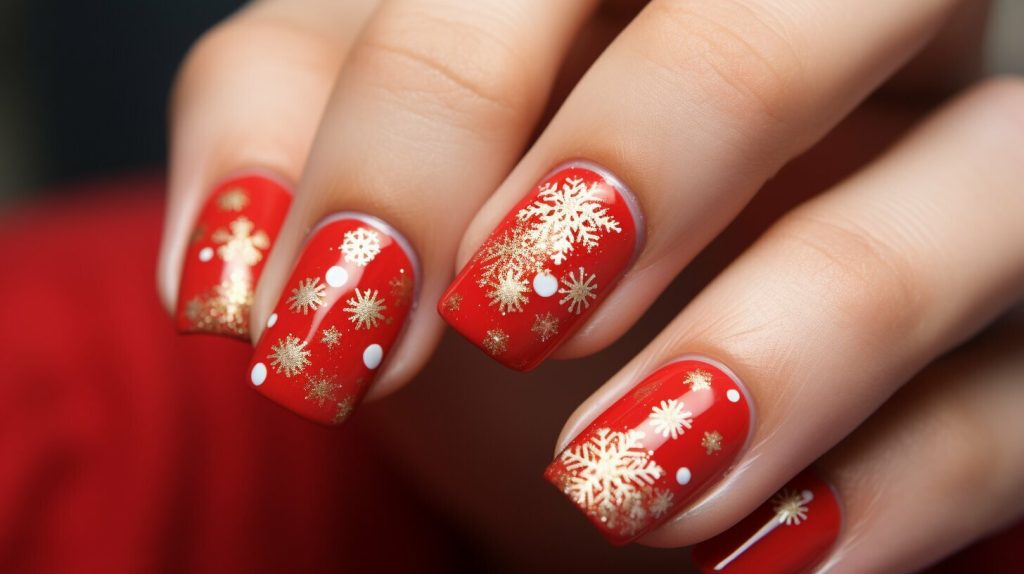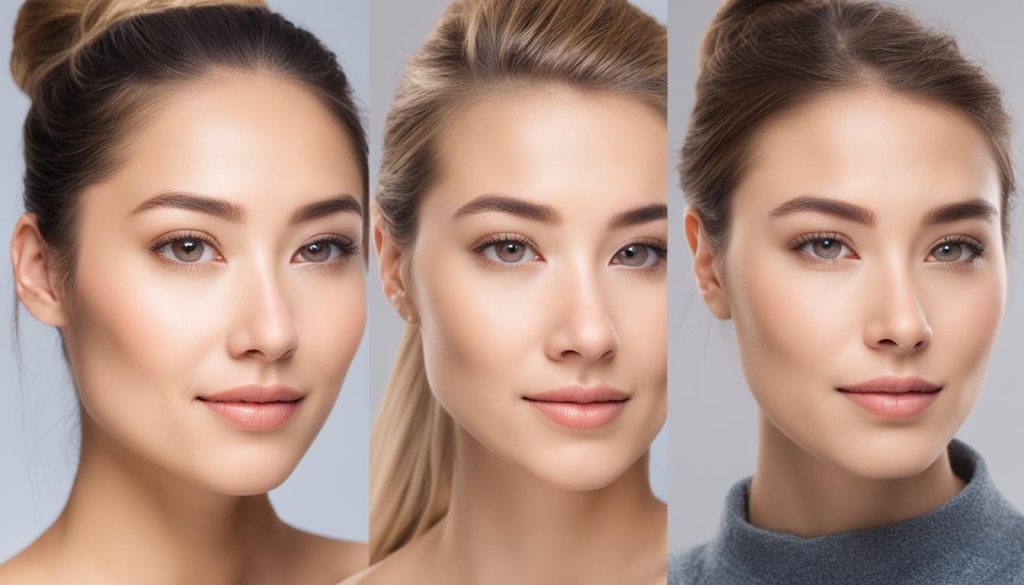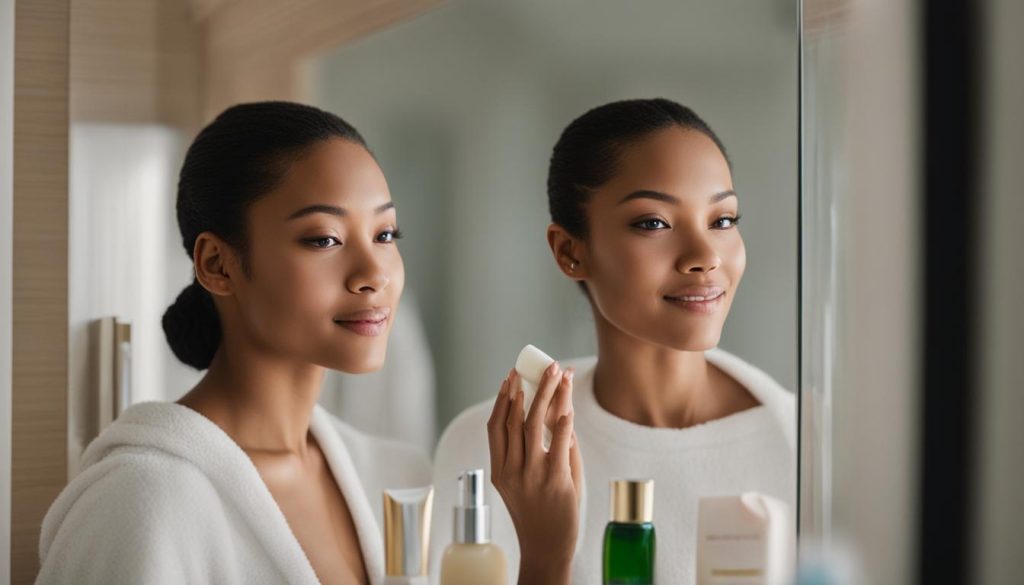Struggling with acne-prone skin can feel like an uphill battle, with every product and routine promising miracles yet often falling short. In my experience, the cornerstone of retaining a blemish-free appearance lies in adhering to a gentle skincare routine specifically designed for prone skin. It’s not merely about the products that grace the shelves of my bathroom, but about the daily rituals that collectively make an impact. Here, I’ll delve into the thoughtful skincare tips for prone skin that I’ve found invaluable, striking the balance between tenderness and effectiveness, and how you too can care for prone skin with both ease and success.
As an unwavering advocate for nurturing rather than battling with my skin, I’ve discovered that gentle skincare for prone skin isn’t just a fleeting trend; it’s a critical component of my overall skin health. In this section, we will explore proven tips for managing prone skin and how simple adjustments in your skincare regimen can yield the clarity and comfort you seek.
Prone Skin Management
- Seek out skincare routines that address acne-prone skin without causing further irritation
- Learn how lifestyle factors such as diet, sleep, and hydration influence the health of your skin
- Understand the importance of gentle care and the pivotal role it plays in managing prone skin
- Educate on effective ingredients and their proper application for a clearer complexion
- Embrace the mantra that a balanced approach includes lifestyle adjustments coupled with suitable skincare products
Understanding Acne-Prone Skin: Types and Triggers
As someone who has grappled with acne-prone skin, I’m acutely aware of the frustration it can bring. Differentiating between noninflammatory acne, such as blackheads and whiteheads, and inflammatory acne, which includes papules, pustules, nodules, and cysts, is crucial for finding effective treatments for prone skin.
One common mistake is to confuse acne with rosacea, particularly when encountering papulopustular rosacea, which bears a strong resemblance to traditional acne breakouts. To tackle the common causes of prone skin, a thorough understanding of the triggers is essential. These often include:
- Hormonal fluctuations that can exacerbate oil production
- An overabundance of oil in the skin
- Dead skin cells leading to clogged pores
- Bacterial growth within pores
On the flip side, while acne has a more defined origin, the causes behind rosacea are not as explicit. They could potentially stem from a mix of genetic disposition and environmental contributors, setting it apart from the common perception of acne vs. rosacea.
I’ve learned that ongoing management, starting with a personal analysis and followed by tailored skincare strategies, plays a significant role in controlling outbreaks. By addressing specific factors such as diet, stress levels, and skincare routines, I have been able to find a path to clearer skin.
Identifying Your Skin Type for Tailored Acne Management
As I journey through the complexities of managing acne-prone skin, I’ve learned that the first step is a critical assessment of my skin type. Knowing whether I have oily skin, dry, combination, or normal skin dictates the foundation of my skincare routine for prone skin. It’s a personalized approach that dermatologists endorse, ensuring the best products for prone skin are in my arsenal, avoiding those that may exacerbate my condition.
To determine my skin type, I perform a simple test: I wash my face with a gentle cleanser, refrain from applying any additional products, and give my skin time to reveal its natural state. After a couple of hours, I check for any oiliness or dryness, indicative of my skin’s tendencies. Armed with this knowledge, I’m able to embark on a CeraVe acne skincare routine that caters specifically to my needs.
Here’s a quick guide on how to identify your skin type:
- Oily Skin: Look for a sheen that tends to develop across your face, particularly in the T-zone area.
- Dry Skin: Feel for patches that are tight or flaky, signaling a lack of moisture.
- Combination Skin: Detect areas that are oily in some spots like your nose and forehead, and dry in others like your cheeks.
- Normal Skin: Sense a balanced texture that’s neither overly oily nor dry.
Now that I’ve identified my skin type, I can focus on a tailored regimen. My routine is particularly aimed at addressing oily skin which is often the bedfellow of acne. However, no matter the type, consistency and correct product selection remain key for a successful skincare routine for acne-prone skin.
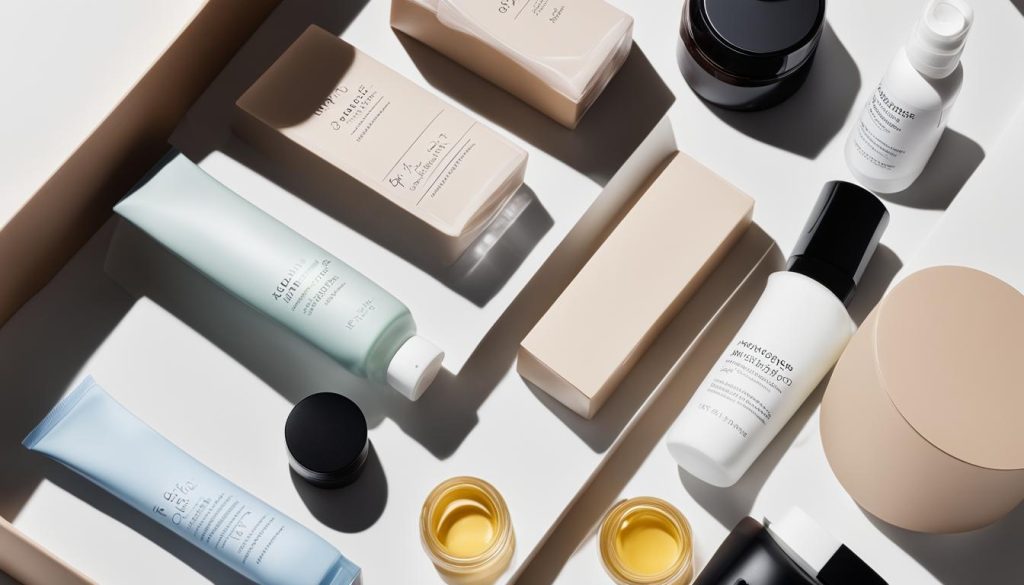
As someone deeply invested in managing acne, I’ve realized that one size never fits all. My exploration in finding the best products for prone skin has become more intuitive, always putting an emphasis on non-comedogenic and oil-free formulas that work in tandem with my CeraVe acne skincare routine. In my next skincare haul, I make sure to select products that support my skin type, rather than complicate my acne management efforts.
The Role of Lifestyle in Promoting Clear Skin
As I reflect on my journey to clearer skin, I firmly believe that a comprehensive approach—beyond just slathering on topical concoctions—is imperative. Embracing a holistic skincare routine, integrating natural remedies for prone skin, and advocating for lifestyle changes for acne management have all been cornerstones of my success. The blemish-battling benefits of the CeraVe 3 Step system, combined with the systemic support of staying hydrated for skin health, cannot be overstated.
- Consistency is key—adhering to a daily skincare regimen tailored to my skin’s needs has been essential.
- Natural remedies, although anecdotal, have supplemented my routine, with a focus on anti-inflammatory and soothing ingredients.
- Making informed lifestyle adjustments, such as prioritizing sleep and managing stress, has had a surprising impact on my skin.
Moreover, I’ve discovered the importance of hydration. Carrying a water bottle everywhere has become second nature, highlighting the link between staying hydrated and a radiant complexion.
In this narrative of clear skin aspirations, I must acknowledge the allure of quick fixes that the internet often peddles. Yet, gauging the influence of dietary alterations or newfangled supplements demands a level of scrutiny, typically provided by a healthcare professional. Such caution stems from the complex nature of acne, and the variable effects such measures may exert.
- Research potential supplements thoroughly and consult with a dermatologist before commencement.
- Exercise discernment with internet trends and fads, ensuring they align with evidence-based practices.
- Understand that dietary impacts on acne, while currently under scientific scrutiny, are not definitively established.
Ultimately, the amalgamation of a reliable skincare routine, prudent lifestyle choices, and the occasional natural remedy has fortified my resolve to sustain a clear and healthy visage. It’s a testament to the power of treating skin care as a full-body concern, rather than a superficial fix.
Essentials of a Daily Skincare Routine for Prone Skin
Establishing a daily skincare routine tailored for acne-prone skin can be transformative, enhancing not just my complexion, but also my confidence. Navigating through countless products and regimens, I’ve learned that effectiveness is contingent upon simplicity and the correct choice of ingredients.
Selecting the Right Cleanser
Finding gentle cleansers for prone skin is pivotal to my regimen. Harsh soaps can strip the skin of its natural oils, which, in turn, may increase oil production and exacerbate acne. I’ve found that CeraVe offers a range of products, such as their hydrating cleanser, explicitly designed to clean sensitive skin acne without irritation, effectively targeting CeraVe whiteheads and other non-inflammatory comedones.
The Importance of Regular Exfoliation
Regular exfoliation has become a cornerstone of my acne skincare routine. It aids in sloughing away dead skin cells that clog pores and can lead to acne. I emphasize ‘regular’ because I’ve learned that overdoing it can irritate my skin, making acne worse. It’s a delicate balance, but the right exfoliation frequency keeps my complexion clear and receptive to acne treatments for prone skin.
Hydrating Acne-Prone Skin Properly
I used to believe that moisturizing wasn’t necessary for my oily, acne-prone skin. However, hydration is essential, as I’ve discovered that properly moisturized skin is less prone to overproducing oil. My moisturizer of choice is a lightweight, oil-free formula that maintains skin hydration without contributing to further breakouts.
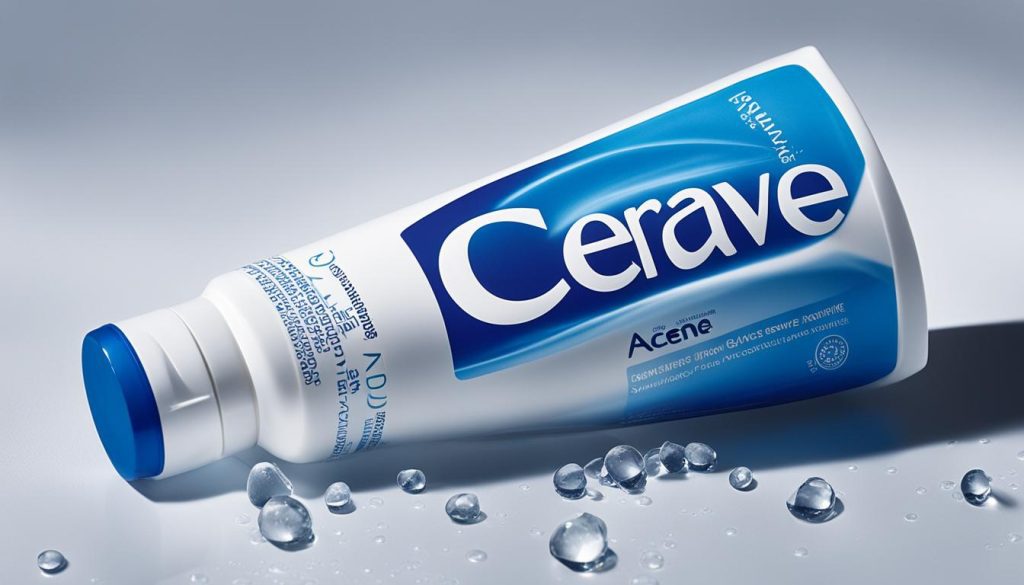
Incorporating these practices into my daily life has not only improved my skin’s appearance; it has also taught me that managing acne-prone skin is as much about consistency and understanding the products as it is about the specific ingredients used. Complete with CeraVe sensitive skin acne solutions, I’ve crafted a skincare regime that keeps my skin looking and feeling its best.
Treating Acne with Over-the-Counter Products
As someone who’s been through the trials and tribulations of managing acne, I’ve discovered that over-the-counter products can be a powerhouse in your skincare arsenal. These remedies may be accessible without a prescription, but their efficacy rivals more intense treatments, especially when deployed with a strategic regimen.
Can CeraVe help with acne? This is a question I hear quite often. In my experience, the key with any skincare brand, including CeraVe, is to understand which products from their line cater specifically to acne-prone skin. For example, CeraVe’s acne regimen involves cleansers and moisturizers that are formulated not only to treat but also to prevent future breakouts.
Leveraging active ingredients like benzoyl peroxide can suppress the bacteria responsible for acne, while salicylic acid aids in exfoliating the skin to clear blocked pores. Retinoids, another pivotal player, work on cellular turnover to reduce the occurrence of acne and the aftermath of post-inflammatory hyperpigmentation. In this context, does CeraVe clear acne? I’ve found that CeraVe products containing salicylic acid, such as their Renewing SA Cleanser, offer a gentle yet effective solution for preventing and managing breakouts.
For those wondering about CeraVe skincare for acne, it’s important to note that consistency and patience are paramount. Products like those in the CeraVe line are designed to function within a systematic skincare routine, with offerings such as AM and PM facial moisturizers that can be matched with specific targeted treatments.
One must approach over-the-counter treatments with caution, being aware that results aren’t instantaneous. It’s advisable to give each new product several weeks to work before deciding on its efficacy. If you’re considering a CeraVe acne regimen, start with a single product to determine your skin’s tolerance before gradually introducing additional treatments.
- Benzoyl peroxide cleanser for morning use
- Retinoid product for evening application
- Use of noncomedogenic moisturizers to combat any potential drying effects
Ultimately, understanding your skin’s unique needs and ingredients that target acne at its source will guide you towards the most effective over-the-counter products. Monitoring your skin’s response and adapting your approach is a journey unto itself, one that could lead you to clearer, healthier skin. Remember, when in doubt, enlisting the advice of a dermatologist can provide personalized guidance tailored to your specific situation.
Professional Dermatology Treatments and When to Seek Them
When my persistent efforts with over-the-counter products and a meticulous CeraVe acne skin care routine were inadequate for my stubborn acne, the decision to pursue a dermatology services consultation became apparent. It signifies a proactive step for those of us grappling with the complexities of acne-prone skin. Professional dermatologists provide a range of targeted therapies that can pivot our journey to skin clarity, especially when standard treatments do not yield the desired results.
Exploring professional acne treatments is not an admission of defeat; rather, it’s embracing a full spectrum of skin health strategies. Treatments such as chemical peels or laser therapies are often suggested by dermatologists to alleviate deep-seated skin issues and are known to effectively reduce the occurrence of severe acne. Additionally, interventions like microneedling and precision-tailored prescription medications address the root cause of breakouts, balancing the skin’s needs with medical expertise.
Wondering when to see a dermatologist for acne? The answer lies in the mirror – if acne continues to flourish despite traditional care, if it inflicts pain and emotional distress, or if noticeable scarring occurs, it is time. The dermatologist’s role is to unravel the individual puzzle of your skin, assessing its nuances and crafting a regime potentially laden with a more potent arsenal, including prescription-strength CeraVe products formulated for professional outcomes. Your skin’s health journey is, after all, uniquely yours, and in-depth understanding provided by a dermatologist could be the touchstone of your success.
FAQ
What are some tips for managing prone skin?
Managing prone skin involves adopting a skincare routine tailored to your skin’s sensitivity. Use gentle skincare products designed for acne-prone skin, cleanse the face regularly but gently to prevent irritation, and always moisturize with noncomedogenic formulas. In addition, don’t overlook lifestyle elements such as a balanced diet, sufficient hydration, and plenty of sleep, as these can significantly influence your skin’s health.
How can I determine if my skin is acne-prone?
If you’re experiencing frequent breakouts, particularly in the form of noninflammatory acne like blackheads and whiteheads, or inflammatory acne such as papules and pustules, your skin may be acne-prone. This skin type can be due to hormonal shifts, excessive oil production, accumulation of dead skin cells, and bacterial growth. Determine your skin type and choose a skincare routine that helps combat these factors.
Is CeraVe a good option for acne-prone skin?
CeraVe offers a range of products that can be beneficial for acne-prone skin due their formulation with ceramides, hyaluronic acid, and other beneficial ingredients. Many find that using a combination of CeraVe cleansers, moisturizers, and treatment products can help in managing their acne. However, results can vary, and it may not be the best fit for everyone. It’s important to observe how your skin reacts to CeraVe or any new product and consult a dermatologist if you’re unsure.
Can lifestyle changes improve acne-prone skin?
Yes, lifestyle changes can positively impact acne-prone skin. Ensuring you’re well-hydrated, consuming a balanced diet rich in fruits, vegetables, and lean protein, minimizing stress, and getting adequate sleep can all contribute to clearer skin. Avoiding smoking and limiting alcohol intake are also beneficial practices for skin health.
What are the best skincare routine steps for prone skin?
A skincare routine for prone skin should include gentle cleansing, exfoliation, and moisturizing. Start with a noncomedogenic cleanser to remove impurities. Exfoliate regularly with a product suitable for acne-prone skin to clear dead skin cells and unclog pores. Finally, even if your skin is oily, use a lightweight, oil-free moisturizer to maintain your skin’s natural barrier and prevent overproduction of oil.
How do over-the-counter acne products work?
Over-the-counter acne products typically contain active ingredients like benzoyl peroxide, salicylic acid, adapalene, and retinol which help to treat acne by exfoliating the skin, killing bacteria, reducing inflammation, and preventing clogged pores. It’s best to introduce these products into your routine gradually to assess tolerance and avoid irritation.
When should I consider seeing a dermatologist for acne?
If you’ve tried various over-the-counter products and your acne persists, worsens, or causes scarring, it’s time to see a dermatologist. A professional can provide a more personalized treatment plan, which might include prescription medications, in-office procedures, and lifestyle recommendations suited to your unique skin needs.

